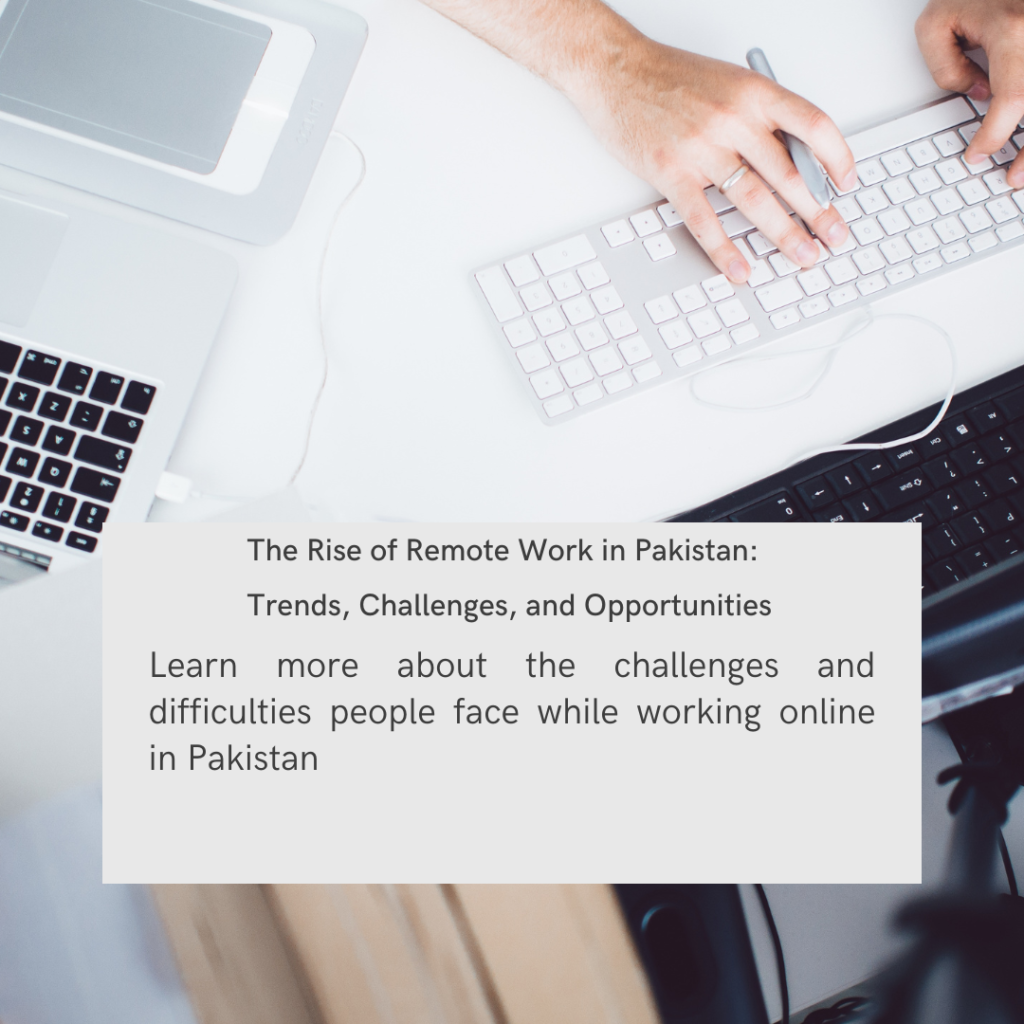
This blog is all about the Remote work in Pakistan.
Work is whatever you do, not where you decide to go. As work from home has shifted our standard notions of employment and manufacturing, the significance of it has become precisely transparent. We are no longer restrained by the office’s exterior barriers and have to operate inflexibly from 9 to 5.
According to Intermedia’s 2020 study findings, a remarkable 74% of professionals forecast that remote work would become mainstream after the global epidemic hits. Their effects are considerable. It’s about revamping the core principles of the culture we have at work, rather than solely about working in your jammies.
If we talk about remote work in Pakistan, we have to see why is this modification taking place? What kind of function does working remotely play? Why should it concern to you? Let’s investigate it:
Flexibility: Limiting yourself to a workstation is no longer a feasible prospect. Remote work in Pakistan allows you to be productive at your own comfort place. It becomes extremely easy for employee to focus on the professional and personal life side by side. It can be a great advantage for healthy mental life.
Increased Productivity: Stanford University research found that remote workers are 13% way more productive and effective than those who doesn’t work from home. It can be due to the mental peace and relaxation one can get while working remotely. It also save the petrol, time, and money.
Enhanced Productivity: In accordance to research from Stanford University, remote workers are 13% higher in productivity than their counterparts who work in offices. Greater amount of work gets done when there is calm surroundings and fewer hours are spent traveling.
Cost-effectiveness: Organizations can save money on expenses such as rent, utilities, and machinery as they never require office space. You save money for formal wear, meals, and conveyance as an employee.
The Rise of Remote Work in Pakistan: Trends, Challenges, and Opportunities

Remote work in Pakistan in not less than an opportunity to earn handsome amount of money. Before the advent of COVID-19, working remotely—that is, working outside of consistently office spaces—was unprecedented in Pakistan. Whereas many people consider it as a luxury, only a handful of workers actively utilize it. However, as lockdowns and social segregation became essential, the early stages of the pandemic encouraged an enormous move toward working from home.
Pakistan’s employment had been seriously impacted by the pandemic; at its height, the country’s workforce declined from 55.7 million to 35 million. While overall number of jobs steadily expanded to 52.5 million, millions of working individuals saw an erosion in their income, especially those employed in the building and nontraditional industries. Areas who suffered most were Sindh, Punjab, and Balochistan, with metropolitan areas like Khyber Pakhtunkhwa encountering severe lack of nutrition and economic distress.
Find out the remote work in Pakistan policy here
Remote work in Pakistan is not only a blessing, but also paving ways for youngsters to explore digital earning platforms. But the absence of digital services seems to be an essential obstacle, especially among rural areas that have limited utilization of trustworthy internet. The disparity in gender has also been made exacerbated by distant work, as women are predominantly responsible for providing unpaid care.
Yet another problem is the vagueness of the lines between both professional and private life; many remote workers find challenging to disconnect from technology after work. Pakistan needs to amend its laws on employment, invest in digital amenities and put in place policies that support workers’ well-being as a means to get around these problems.
Even though remote work has been seen to be beneficial for retaining business continuity in times of emergency, there are still multiple obstacles in blocking the progress of its widespread utilization in Pakistan. The potential positive aspects of remote work would be severely restricted in Pakistan unless there is better infrastructure along with encouraging regulations in force.
How Remote Work Is Transforming the Pakistani Job Market
Earlier to the epidemic, remote work was not extremely prevalent in Pakistan. A good deal of jobs were found in physical places such as offices. However, companies in Pakistan, like those worldwide, faced the need to make the shift to remote work as COVID-19 broadened.
Remote work in Pakistan has made it feasible for educated people to showcase their skills in best ways possible. The switch was challenging at first, but it promptly became evident that working remotely might have plenty of benefits. Pakistan reported an impressive rise in remote work in 2020. In accordance to a World Bank scrutiny, the epidemic boosted Pakistan’s recognition of digital tools, particularly in the cities.

Businesses in industries like marketing, education, and information technology quickly accepted remote work models as lockdowns were enacted. According to a Gallup Pakistan study undertaken in 2021, about half of Pakistan’s urban workers worked from home during the epidemic. Countless domestic and foreign businesses have begun using remote workers, specifically in marketing, customer support, IT, and content writing professions.
You can also find out more about Daraz Affiliate program which is a remote work in Pakistan and providing opportunities to earn money from home.
Rise in Freelance and Gig Economy Jobs

Tremendous changes have been observed in various sectors due to remote work in Pakistan. Pakistan’s freelance and gig economy has benefited considerably from the shift to remote labor. Pakistani job seekers preferring job opportunities that are flexible have begun to flock to platforms such as Upwork, Fiverr, and Freelancer.
Pakistan’s freelance industry has grown considerably placing the nation among the top five freelancing nations in the world, according to the Pakistan Software Export Board (PSEB). The effects of remote labor in Pakistan are demonstrated by specific figures. According to a 2023 Payoneer survey, 60% of Pakistani freelancers use this approach to improve their work-life balance and increase their income.Nowadays, a lot of job searchers support freelancing, mainly because it gives them flexibility. Pakistani freelancers usually work in the arenas of web development, graphic design, digital marketing, and content writing, all of which are currently in great demand across the country.

In conclusion, people in Pakistan have been helped from autonomy and the affordability that remote work has generated. It also saves the fuel and travel time. Women are often more blessed to be introduced with the remote work in Pakistan, because they find it feasible to manage work and home single handedly. Challenges also exist side by side which can be resolved with collective efforts and collaboration among educated people, workplaces, and governmental institutes.


Pingback: Boost Your Google AdSense Earnings with Proven Strategies